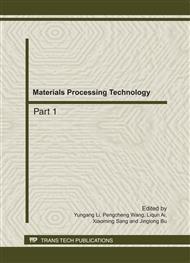[1]
Basnet C., Corner J., Wisner j., and Tan k-c, "A Survey of Supply Chain Management Practice in New Zealand", In Proceedings of the 34th Annual Conference of the Operational Research Society of New Zealand, Hamilton, NZ, December, 1999, pp.309-318
DOI: 10.1108/13598540310463369
Google Scholar
[2]
Coolican, H., Research Methods and Statistics in Psychology, Hodder & Stoughton, London, (1994)
Google Scholar
[3]
Chopra, S., Meindl, P., Supply Chain Management, strategy, planning, operations, Third edition, Pearson Prentice Hall, (2007)
Google Scholar
[4]
Halldo´rsson, A., P. D. Larson, and F. R. Poist, "Supply chain management: a Comparison of Scandinavian and American perspectives", International Journal of Physical Distribution & Logistics Management, 38 (2), 2008, pp.126-14
DOI: 10.1108/09600030810861206
Google Scholar
[5]
Kadambi, B., "IT-Enabled supply chain management – a preliminary study of few manufacturing companies in India", available from: http://www.xlri.ac.in/cltm/LogistiX-2-2000.htm, [Access on 18 August 2010], (2000)
Google Scholar
[6]
Larson, P. D., Poist, R.F., "Improving response rates to mail surveys: a research note". Transportation Journal 43(4), 2004, pp.67-74
Google Scholar
[7]
Mentzer, J.T., DeWitt, W., Keebler, J.S., Min,S., Nix, N.W., Smith, CD. And Zacharia, Z.G., "Defining Supply Chain Management", Journal of Business Logistics, 22 (2), 2001, pp.1-25
DOI: 10.1002/j.2158-1592.2001.tb00001.x
Google Scholar
[8]
Olhager J., Selldin E., "Supply chain management survey of Swedish manufacturing firms". International Journal of Production Economics, 89, 2004, p.353–361
DOI: 10.1016/s0925-5273(03)00029-x
Google Scholar
[9]
Quayle, M., "A study of supply chain management practices in UK industrial SMEs". Supply Chain Management: An International Journal, 8 (1), 2003, pp.79-86
DOI: 10.1108/13598540310463387
Google Scholar
[10]
Ruteri, J. M. and Qi Xu., "The Food Industry Sector in Tanzania", International of Journal of Business and Management, 4 (12),(2009)
Google Scholar
[11]
Sue Q.,Shi j., Lai Sh., Study on supply chain management of Chinese Firms from the institutional view, International Journal Production Economic, 115, 2008, pp.362-373
DOI: 10.1016/j.ijpe.2007.11.016
Google Scholar
[12]
Van O.D., Tan. A., Fernandes, C. , Survey Report on the Role of IT to Enhance Supply Chain Management in UAE Companies [online], ,[Access on 20 November 2010], http://www.ssmgroup.org/upload/The%20Role%20of%20IT%20to%20enhance%20SCM%20in%20UAE%20companies.pdf, (2010)
Google Scholar


